Key takeaways:
- Experiencing the beauty of marine ecosystems firsthand ignited a deep passion for ocean conservation and awareness of environmental responsibility.
- Witnessing the impacts of climate change, overfishing, and plastic pollution emphasized the urgency of protecting marine life.
- Taking concrete actions, such as adopting a zero-waste lifestyle and engaging communities in conservation efforts, demonstrates the potential for individual contributions to make a difference.
- Sharing personal stories and leading by example can effectively inspire others to engage in and advocate for ocean protection.
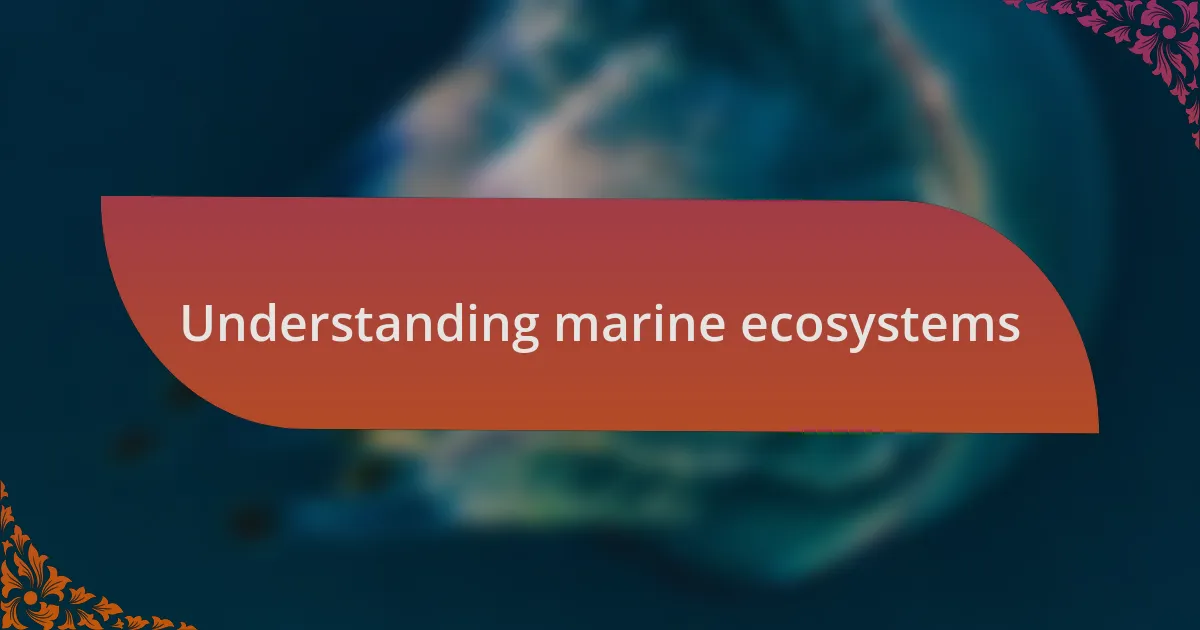
Understanding marine ecosystems
Understanding marine ecosystems is like uncovering a world beneath the waves, rich with connections and complexities. I remember the first time I dove into a coral reef; the vibrant colors and diverse life forms left me in awe. How could such beauty exist hidden beneath the surface, teeming with life yet so vulnerable to change?
Each organism, from the tiniest plankton to the largest whale, plays a critical role in maintaining the balance of these ecosystems. I often find myself reflecting on how interconnected we truly are; our actions on land can ripple out to affect distant marine environments. Have you ever considered how a simple piece of plastic can disrupt the delicate habits of marine species far away?
As I learned more about these underwater worlds, I discovered that they are not just iconic landscapes but crucial to our planet’s health. During one of my beach clean-up days, seeing the impact of pollution firsthand sparked a deep emotional response in me. It made me realize that understanding marine ecosystems isn’t solely about appreciating their beauty but also about understanding our responsibility to protect them.
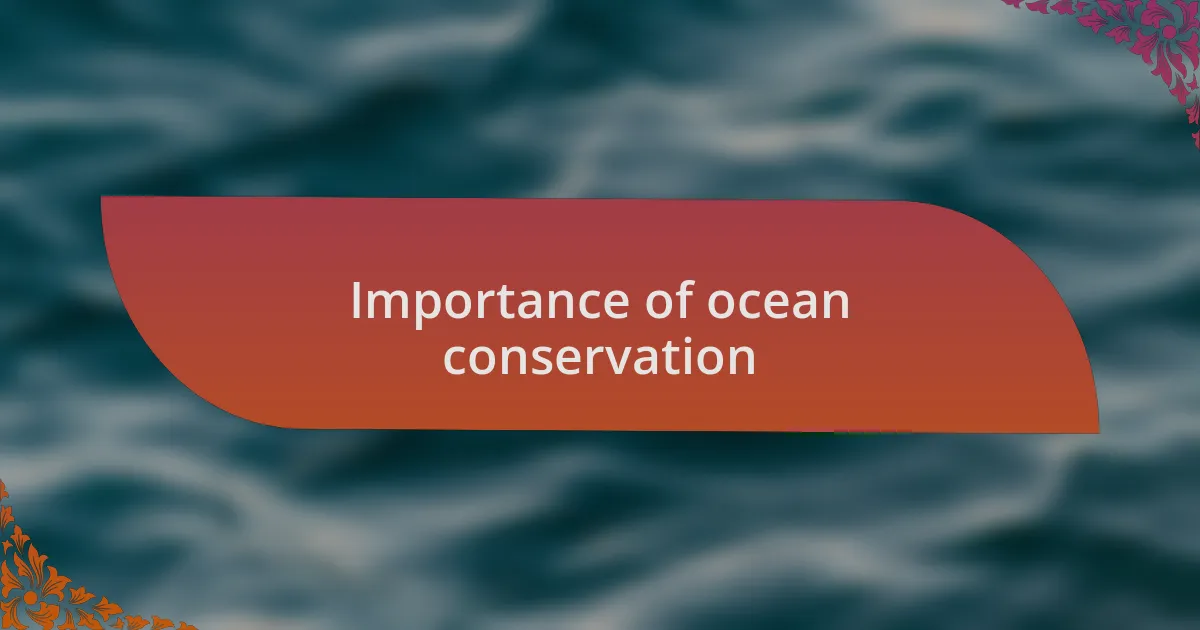
Importance of ocean conservation
The oceans cover over 70% of our planet, yet their health is often overlooked. I still recall the day I witnessed a massive school of fish darting gracefully through the water, only to realize that their habitat was under threat from overfishing. This experience opened my eyes to the vital role oceans play in maintaining biodiversity. Would we even exist without the intricacies of these underwater habitats?
One of the most striking things I learned is that ocean conservation directly impacts our climate. The oceans absorb about a quarter of the carbon dioxide we produce. During a marine biology course, I was stunned to discover that this absorption helps moderate global temperatures. So, when we think about ocean conservation, we should also consider our own future. Isn’t it fascinating how interconnected our fate is with these waters?
Every time I pull on my wetsuit for a dive, I remember that ocean conservation isn’t just an environmental issue; it’s a moral obligation. I’ve seen firsthand the devastating effects of pollution and habitat destruction. The thought of future generations not experiencing the wonders of marine life fills me with urgency. How can we sit back and allow these incredible ecosystems to fade away, knowing the treasures they hold?
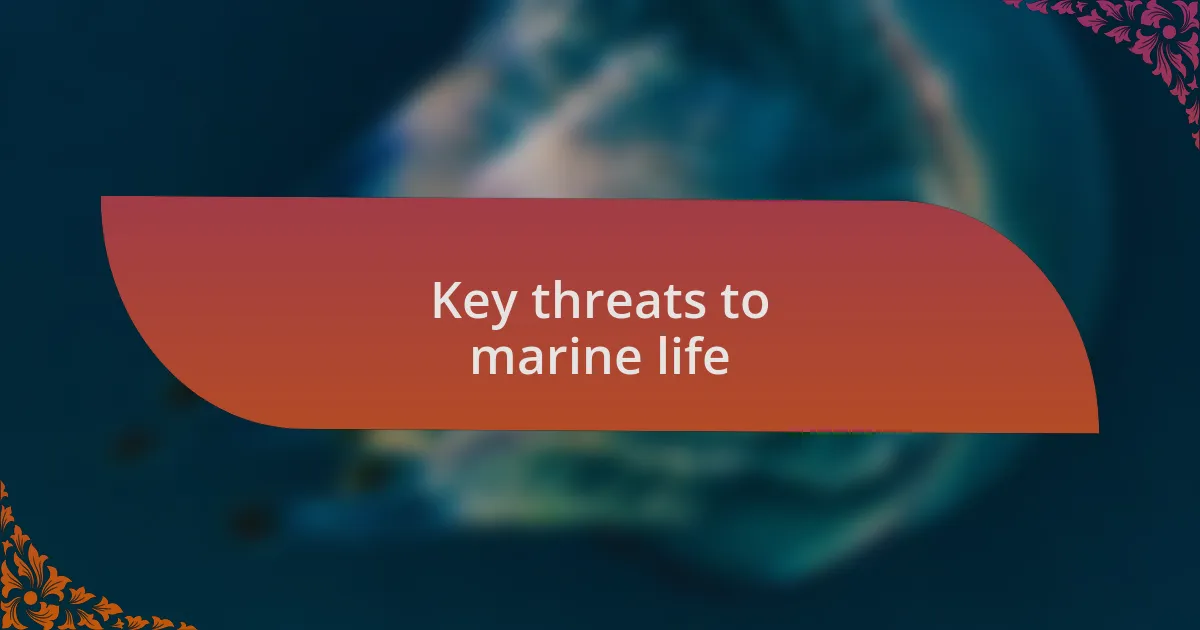
Key threats to marine life
The impact of plastic pollution is astounding and disturbing. During a beach clean-up I participated in, I was overwhelmed by the sheer volume of plastic waste I encountered. Sorting through the debris, I saw firsthand how these materials harm marine creatures. Doesn’t it make you think about the choices we make every day and their ripple effects on the ocean?
Another significant threat is climate change, which increasingly alters marine ecosystems. I remember standing on a coastal cliff, watching significant coral bleaching transform vibrant reefs into ghostly structures. The loss of biodiversity is not just a number; it’s an emotional reality that impacts us all. Are we truly prepared for a future where our oceans are stripped of their vibrant life?
Overfishing is yet another grave concern, driving many species to the brink of extinction. During a research dive, I observed barren areas that once thrived with marine life, now eerily silent. I couldn’t shake the feeling of loss, as if the ocean itself was mourning its missing denizens. Shouldn’t we take a stand to protect these species and restore balance to our oceans?
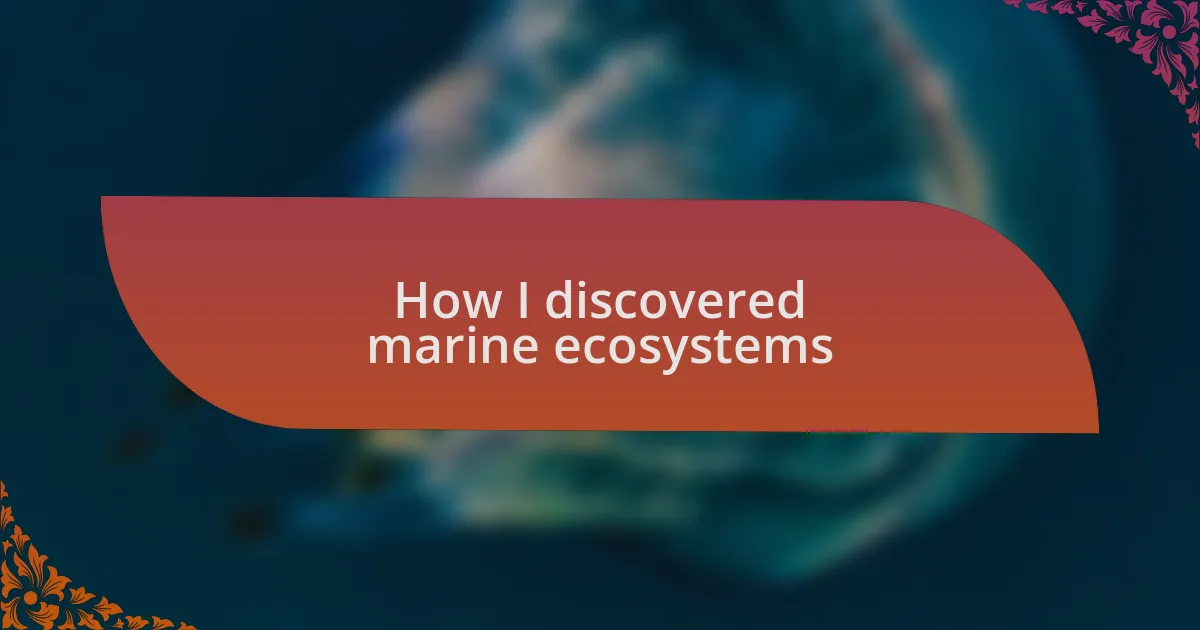
How I discovered marine ecosystems
My journey into the world of marine ecosystems began unexpectedly during a family vacation. I vividly recall snorkeling in a secluded bay, surrounded by vibrant fish and swaying seaweed. At that moment, I was captivated, realizing that these underwater realms were teeming with life far beyond what I had ever imagined.
I can still feel the excitement of my first visit to an aquarium that showcased local marine flora and fauna. As I watched a documentary on ocean conservation there, I was struck by the delicate balance of life in these ecosystems. It sparked a curiosity in me—how could these enchanting environments be preserved when faced with such overwhelming threats?
Years later, as I volunteered for a marine conservation group, the depth of the marine ecosystem’s complexity became clearer. While collecting data on local species, I often found myself pondering how each organism, regardless of size, plays a role in this intricate web of life. Have you ever stopped to consider the significance of even the tiniest creatures in our oceans? They truly are the unsung heroes of marine balance.
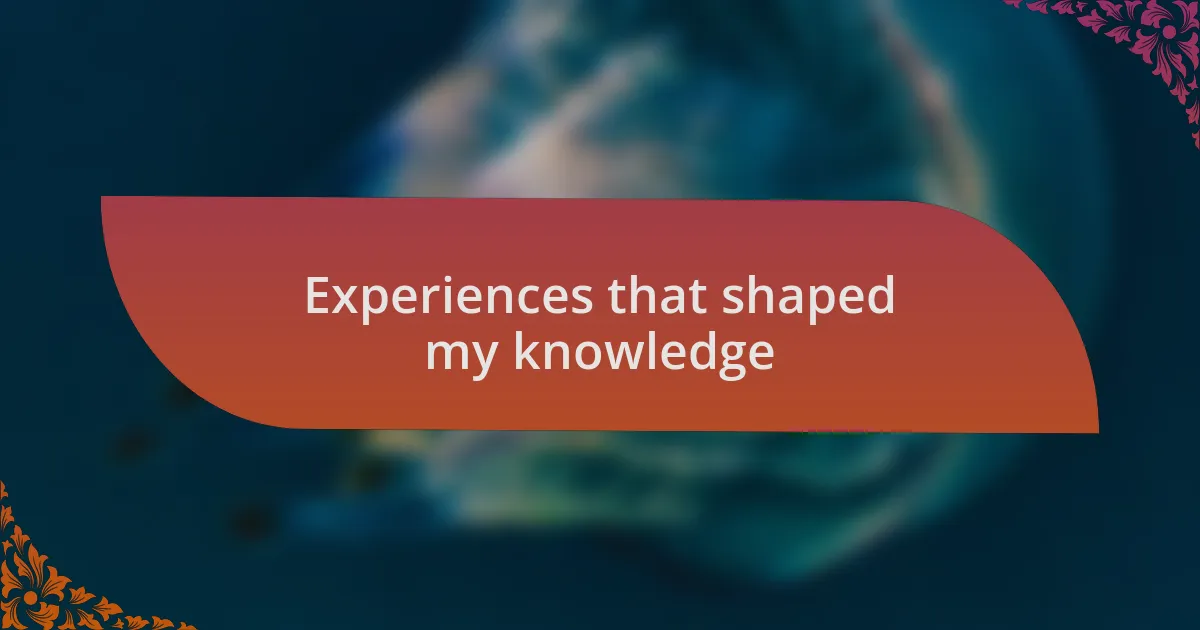
Experiences that shaped my knowledge
One of the most profound experiences that shaped my understanding of marine ecosystems occurred during a field trip to a coastal wetland. As I wandered through the mangroves, I remember the feeling of the soft, muddy earth beneath my feet and the cacophony of life around me. That day, I learned how these wetlands serve as crucial nurseries for fish and a protective barrier against storms, highlighting their importance in maintaining coastal health.
Another pivotal moment was when I participated in a beach clean-up. As I picked up bits of plastic and debris, I couldn’t help but feel a deep sense of responsibility. It struck me how our everyday actions directly impact marine life. Have you ever reflected on how a single piece of litter can disrupt the feeding habits of a seabird or entangle a turtle? That realization transformed my perception of conservation from abstract ideals to tangible actions.
Most recently, during a coral reef monitoring dive, I was overwhelmed by the beauty and fragility of this underwater city. I will never forget the colors that exploded around me or the sinking feeling of seeing areas bleached by climate change. Standing amidst those corals, I understood the urgency of protecting these ecosystems. It made me ask myself, how can we turn our awareness into action? The answers, I believe, lie in our commitment to education and action for marine conservation.
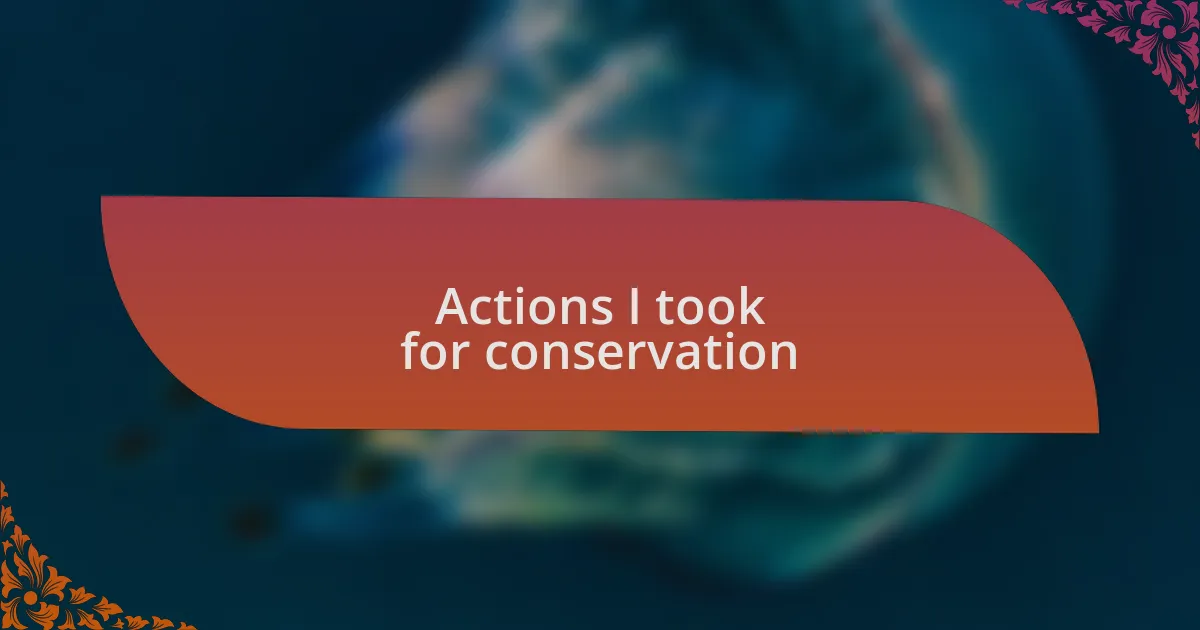
Actions I took for conservation
Taking action for conservation has been a journey filled with personal commitment. I decided to adopt a zero-waste lifestyle, which started with simple steps like using reusable bags and bottles. I remember the satisfaction I felt the first time I realized I had gone an entire week without contributing to any plastic waste. It was empowering to know that my choices could help reduce the burden on our oceans.
In an effort to engage others, I organized workshops in my community about sustainable fishing practices. The first time I saw children’s faces light up as they learned about the importance of fish populations, I knew I had made a connection. It made me reflect: how do we inspire the next generation to protect what they love? Sharing that knowledge, I believe, is crucial for fostering long-term stewardship of marine ecosystems.
Additionally, I became a member of a local marine conservation group, where we regularly participate in habitat restoration projects. On a particularly memorable day, we replanted seagrass, and I was struck by the thought that each little blade could support a whole ecosystem. I can’t help but wonder—what if every person took just one action to restore our oceans? Each effort counts.
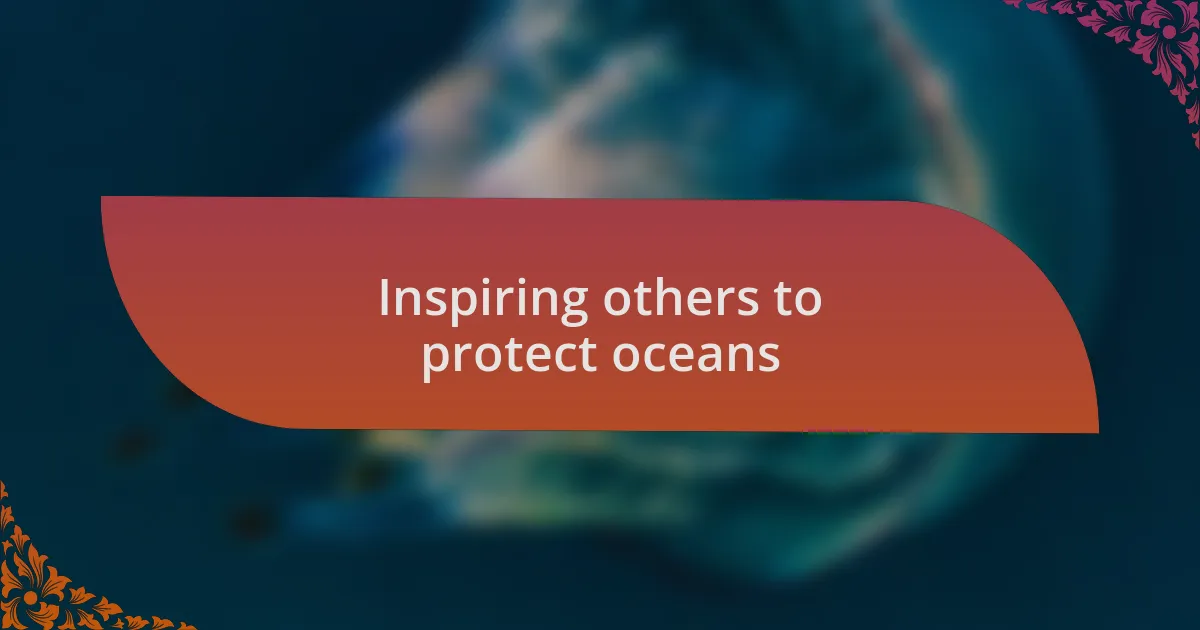
Inspiring others to protect oceans
In my journey of inspiring others to protect our oceans, sharing personal stories made the biggest impact. I recall a beach clean-up day when a young girl approached me with a handful of plastic debris. She looked up, confused, and asked, “Why do people litter if it hurts the ocean?” That moment highlighted for me the genuine curiosity that children have; it’s essential we nurture it. How can we communicate the importance of our oceans in a way that resonates deeply with them?
One of the most rewarding experiences was when I collaborated with a local school to create an art project focused on ocean life. The students crafted incredible pieces from recycled materials, and during the unveiling, their pride was palpable. It struck me how creativity can fuel passion for conservation. How do we ignite that fire in others? Understanding that art can bridge the gap between awareness and action is key.
I’ve found that leading by example is one of the most powerful ways to inspire change. When friends and family see my commitment—like participating in citizen science projects and sharing the results online—they often want to join in. Witnessing someone transform from a casual bystander to an enthusiastic advocate warms my heart. What if we all took the time to encourage that transformation in our circles? It’s moments like these that can create a ripple effect, prompting more people to take action for our oceans.